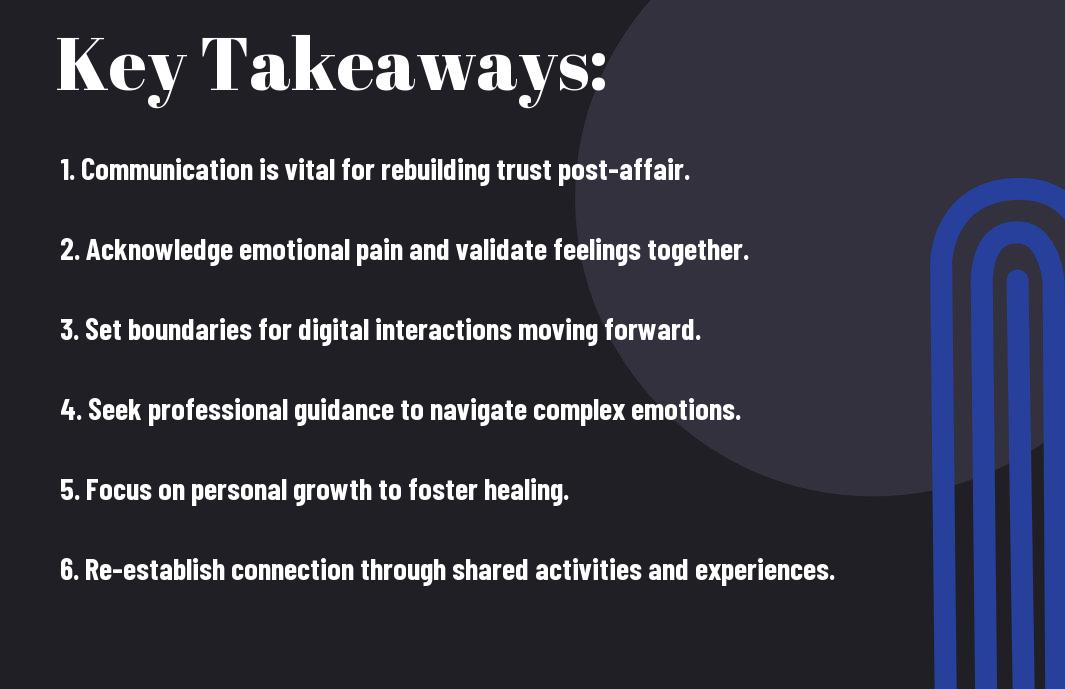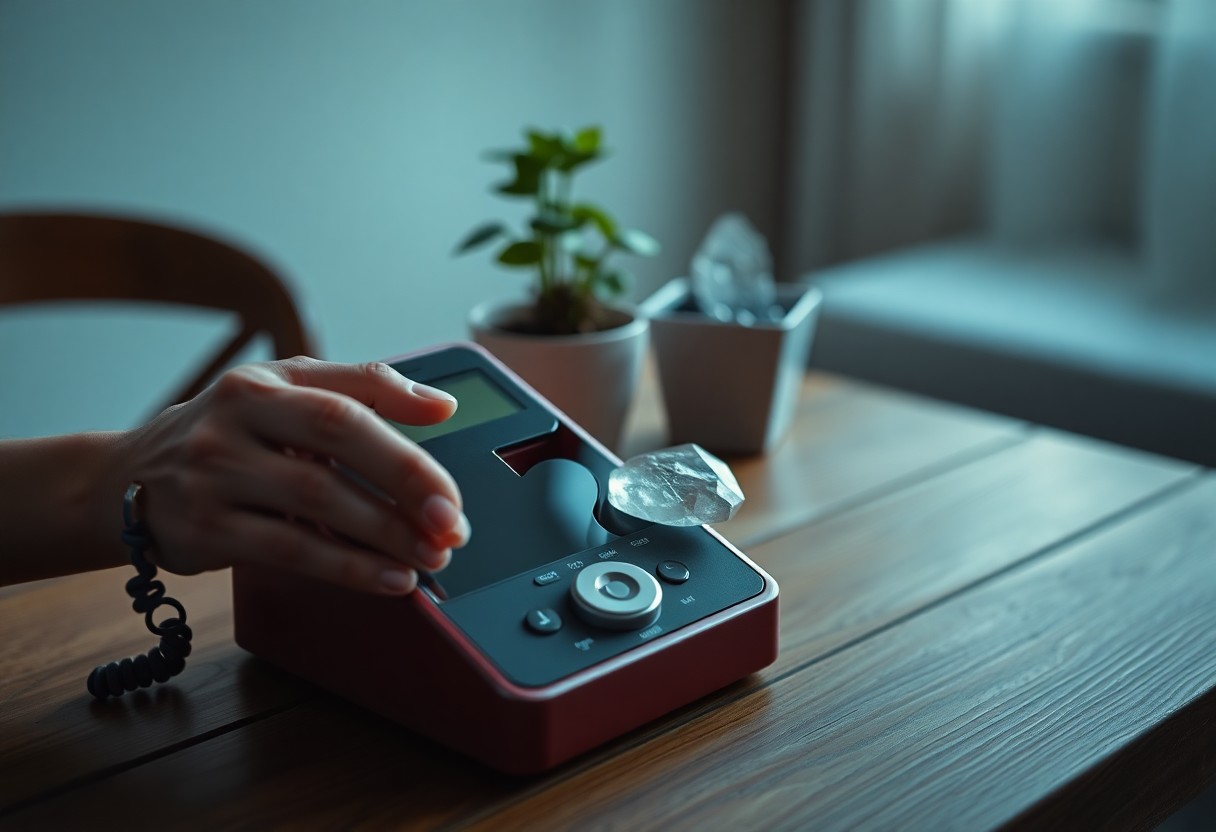With the rise of digital communication, online affairs can shatter trust and leave you feeling lost. If you’ve experienced this type of betrayal, it’s important to understand the emotional impact and steps necessary for your recovery. This guide offers insights into healing from the pain of an online affair, empowering you to rebuild trust and strengthen connections, whether with your partner or within yourself. Explore practical strategies to navigate this difficult journey as you reclaim your emotional well-being and move forward in a healthier way.
Key Takeaways:
- Understanding the emotional impact of online affairs is important for both partners in the relationship.
- Communication must be open, honest, and constructive to foster healing after digital betrayal.
- Establishing boundaries regarding technology and social media can help rebuild trust.
- Regularly engaging in couple’s therapy can provide support and facilitate recovery.
- Identifying underlying issues in the relationship can prevent future breaches of trust.
- Practicing self-care is important for individual healing after experiencing betrayal.
- Forgiveness, whether given or received, is a key component in moving forward together.

Understanding Digital Betrayal
Before you can begin the healing process, it’s vital to comprehend what constitutes digital betrayal. This form of infidelity transcends traditional boundaries, manifesting through secretive online interactions that erode trust, leaving you feeling hurt and confused. The anonymity and ease of digital communication can lead to emotional disconnection or even physical encounters, which can deeply impact your relationship. Understanding these implications is the first step towards recovery from a digital affair.
Defining Online Affairs
Against conventional beliefs, online affairs are not limited to physical cheating. They can involve emotional connections formed through social media interactions, messaging apps, and online gaming. These virtual relationships often blur the lines between friendship and infidelity, as you may engage in intimate conversations and share personal details with someone outside your relationship.
The Impact of Digital Infidelity
Online betrayal can have severe repercussions for your emotional wellbeing and relationship health. You may experience feelings of betrayal, anger, and sadness when confronting digital infidelity. It can lead to a deep sense of loss as you grapple with trust issues and emotional scars. Quality of life, intimacy, and communication in your relationship could suffer, making it vital to address the repercussions swiftly and thoroughly.
Further, the effects of digital infidelity are often multifaceted and can linger long after the discovery. You might find yourself experiencing anxiety and depression as you question the validity of past interactions. Trust can erode swiftly, leading to the breakdown of communication between you and your partner. It may also trigger intrusive thoughts, making it difficult for you to regain a sense of normalcy. Acknowledging and confronting these impacts is vital for paving a way towards healing.

Recognizing the Signs
You may find it challenging to acknowledge that something is amiss in your relationship. By recognizing subtle hints and shifts in behavior, you can gain clarity about your partner’s emotional commitment. Understanding these signs is the first step toward addressing potential issues stemming from an online affair.
Behavioral Changes
Against your better judgment, you might dismiss odd behavioral shifts from your partner. They may increasingly isolate themselves, spending more time on their devices or being secretive about their online activities. These changes can be alarming and signal that your partner is emotionally or physically investing in someone outside your relationship.
Emotional Indicators
Indicators of emotional distance can be subtle yet telling signs that something is wrong. You may notice your partner becomes more irritable or withdrawn, lacking the usual warmth and affection you once shared. They might insist on privacy regarding their messages or unexpectedly change their schedule, making it difficult for you to connect emotionally.
This not-so-subtle shift in emotional availability can be a profound warning signal. If your partner is pulling away, you may see a lack of intimacy and interest in spending quality time together. Additionally, if they display heightened defensiveness in conversations about personal issues, this could indicate they are harboring secrets. Acknowledging these emotional indicators may empower you to seek clarity and resolve underlying issues in your relationship.
The Healing Process
Keep in mind that healing from an online affair is a journey that takes time and effort. To aid your recovery, you may want to explore Affair Recovery: 7 Stages to Heal Your Relationship. Each stage brings you closer to understanding your emotions and rebuilding trust, allowing you to emerge stronger as a couple.
Acknowledgment and Acceptance
An important step in your healing journey is acknowledging and accepting the betrayal. This means confronting the reality of what occurred and how it has affected you and your relationship. Only through this process can you begin to heal and work toward rebuilding your connection.
Communication Strategies
Around effective healing lies open and honest communication. You should ensure that both you and your partner feel safe to express your feelings, needs, and concerns without fear of judgment. Establishing guidelines for these conversations can aid in keeping discussions productive and focused.
Consequently, practicing active listening and validating each other’s feelings is important to foster a deeper connection. Use empathetic language and avoid accusations during discussions, which may create defensiveness. Additionally, consider scheduling regular check-ins to evaluate how both of you are feeling about the recovery process. This way, you can create a safe space where you both feel heard and supported, ultimately paving the way for a more trusting and resilient relationship.
Rebuilding Trust
All relationships require a foundation of trust, and rebuilding it after an online affair may seem daunting. However, with open communication and a commitment to healing, you can begin to restore the connection that has been damaged. It’s crucial to understand that this process takes time and consistency, so be patient with yourself and your partner as you navigate the road ahead.
Steps to Re-establish Trust
Against the odds, you can take tangible steps to rebuild trust in your relationship. Start by engaging in honest dialogues, allowing both parties to express their feelings openly. Set clear boundaries to help alleviate insecurities, and ensure accountability by checking in with each other regularly. Ultimately, your willingness to work together will be key in moving forward.
The Role of Transparency
Around every corner of your journey to rebuild trust lies the necessity of transparency. Without openness, doubts may arise, hindering progress between you and your partner. You must foster a culture of honesty by sharing your feelings, concerns, and actions. This will not only reassure your partner but also allow you to address any lingering questions.
Also, cultivating transparency involves more than just sharing information; it requires a genuine commitment to being open and forthcoming about every aspect of your relationship. You might consider sharing your daily activities or feelings to provide your partner with a sense of security. Additionally, being open about your online interactions can help dispel rumors and build reassurance. When your partner feels secure, it encourages dialogue, strengthens your bond, and ultimately leads to a healthier, more resilient relationship.

Seeking Professional Help
Your journey to recovery from an online affair can greatly benefit from the guidance of a professional. Therapy can provide a safe space to address the emotional turmoil resulting from digital betrayal, helping you to process feelings of anger, hurt, and confusion. Professionals offer the tools necessary for rebuilding trust and fostering healthier communication within your relationship.
When to Consider Counseling
Across various stages of your healing process, it might be beneficial to seek counseling if you feel stuck in feelings of betrayal or if your relationship is struggling to recover. Early intervention can facilitate more effective healing and help you understand underlying issues that contributed to the affair.
Therapy Options for Couples
On your path to recovery, couples therapy can provide structured support as you navigate the complexities of your relationship post-betrayal. Seeking help together is fundamental to understanding each other’s perspectives and working collaboratively towards healing.
Plus, couples therapy may include various approaches, such as emotionally focused therapy and cognitive-behavioral therapy, designed to rebuild trust and communication. Sessions allow you to explore feelings in a guided environment while setting healthy boundaries and fostering mutual understanding. A therapist can assist you in recognizing patterns of behavior that led to the affair and help you develop strategies for maintaining a stronger bond moving forward. Prioritizing your mental and emotional health through therapy is pivotal in your recovery journey.
Moving Forward
Once again, commenceing on the journey of healing after a digital betrayal involves redefining your relationship with both yourself and your partner. As you take steps toward recovery, it’s vital to envision a future that prioritizes trust, communication, and emotional safety. This phase allows for personal growth and rejuvenation, preparing you for a stronger bond, whether that means rebuilding together or moving on separately.
Creating a New Relationship Framework
By establishing a new foundation for your relationship, you can effectively cultivate an environment where both partners feel secure and valued. This may involve setting clear boundaries, improving communication techniques, and prioritizing transparency to foster a deeper connection.
Embracing Forgiveness
Relationship recovery often hinges on the power of forgiveness. To heal fully, you must be willing to let go of resentment and anger that can linger after betrayal. Forgiveness does not mean condoning the actions of the past but rather freeing yourself from the burden of pain. It’s about understanding the context of the betrayal and choosing to focus on the possibility of growth and renewal. This process may take time, but it can ultimately lead to a stronger emotional bond and a more positive environment for both you and your partner.
Final Words
Hence, recovering from an online affair requires understanding, patience, and open communication. You must confront the hurt and betrayal while establishing boundaries for your healing process. Engage in honest conversations with your partner about your feelings and needs, and consider seeking professional support if necessary. By nurturing trust and fostering emotional intimacy, you can pave the way for renewed connection and a more resilient bond, ultimately allowing you to move forward from this challenging experience.
FAQ
Q: What is an online affair, and how does it differ from traditional infidelity?
A: An online affair typically involves emotional or sexual connections formed through digital platforms, such as social media, chat rooms, or online dating sites. Unlike traditional infidelity, which usually occurs through physical interactions, online affairs can be predominantly emotional and may lack physical contact. However, the emotional impact can be just as profound as physical betrayals. In both cases, trust is broken, leading to feelings of hurt, confusion, and often requiring recovery and healing.
Q: What steps should I take to begin healing after discovering a digital betrayal?
A: Healing after a digital betrayal often begins with honest communication. It’s important to express your feelings to your partner and discuss the impact of their actions on your relationship. Seeking support from friends, family, or a therapist can provide additional perspectives and encouragement. Establishing boundaries and taking time for self-care are also important, as they allow you to process your emotions and begin rebuilding trust—both within yourself and in your relationship.
Q: How can couples rebuild trust after an online affair?
A: Rebuilding trust requires transparency and consistent efforts from both partners. The person who committed the betrayal should be willing to answer questions and provide reassurance. Setting clear boundaries around technology use, such as sharing passwords or limiting interactions with certain people, can help ease anxieties. Therapy can also be beneficial, allowing couples to explore underlying issues and improve communication skills, which are imperative for reestablishing trust.
Q: What are some common emotional responses to discovering an online affair, and how can I cope with them?
A: Common emotional responses include anger, sadness, confusion, and feelings of inadequacy. It’s normal to experience a rollercoaster of emotions during this time. Coping strategies can include journaling to express feelings, engaging in physical activities to relieve stress, and seeking support from close friends or counselors. Practicing mindfulness techniques or joining support groups can help you process your feelings and focus on personal healing.
Q: Is it possible for a relationship to survive after an online affair, and what factors contribute to its success?
A: Yes, many relationships can survive and even thrive after an online affair. Key factors include the willingness of both partners to communicate openly about feelings and experiences, a commitment to understanding the reasons behind the betrayal, and a mutual desire to work on the relationship. Investing time in rebuilding emotional intimacy and establishing new patterns of trust can lead to a stronger bond. Professional guidance through couples counseling can significantly enhance the chances of success.
